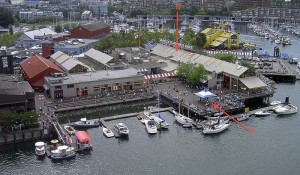When I arrived at Headway, Maxim* was preparing lunch, Aalbert* was chatting with him and Shane* was crocheting a hat for himself. This relaxed, homey atmosphere was a big departure from my past volunteer experiences where therapists from various disciplines run the programs and therapy is the primary focus. This facility’s approach is very interesting; while members practice and strengthen their skills, they are in charge of what they do and rather than having therapists oversee the progress, they assist and correct each other.
Prior to walking club, I had an hour to meet and talk with the members. Something that surprised me was how welcoming the members were towards me, complete stranger up until I introduced myself. For my facilitation, I read several papers, including Phelan et al. (2011), which discussed the stigma individuals can experience due to their injury, so I guess I expected them to be cautious when meeting strangers. Aalbert, for example, was very chatty, asking me everything from what I am studying, to movies that I like, to how I got there that day. On the walk, I had the pleasure of talking with Maxim and Adrianna*. That was my first time to Granville Island, so both members showed me the highlights. Adrianna and I also got to talking about travelling. I am going to Europe in May, and as a seasoned traveler, Adrianna shared her travelling tips and described her favourite places in the regions I’ll be visiting.

Granville Island Highlights According to the Walking Club
A) On the pier, I was warned about eating outside because the birds are ruthless!
B) The market has some of their favourite sweets.
the location where bands play live music in the summer and the marina where a family of three sea lion sometimes sunbathe
(image via wikipedia)
In this course, we have discussed a wide range of symptoms that can result for TBI and in my short two-hour visit I did notice a few of these being displayed by the members. I would hesitantly classify them under attention, language, memory and difficulty multitasking. With my background in speech sciences, I noticed a wide variety of language abilities in the members. Several members had slowed speech, although their intonation was intact. Maxim showed some difficulty with word retrieval; depending on the topic of conversation, he would pause midsentence and be silent until he remembered the word or start on a new topic. Adrianna seemed to have an impaired ability to detect sarcasm, although it should be noted that even people without injury could have difficulties with this. Finally, while Shane was extremely energetic and animated while he spoke, he was hard to understand. Without knowing what his native language is and his fluency in English prior to his injury, it is hard to know if he is speaking a combination of the two languages or had some other impairment.
I greatly appreciate the opportunity to meet these members. In school and in the literature, there is a tendency to get focused on what can go wrong, with far less attention to what has remained unchanged and how these symptoms affect a survivor’s everyday life. The interactions also emphasized how each injury is unique, that an individual’s symptoms can vary across situations and that their symptoms do not overshadow the person that they are.
*Name had been changed.

3 responses to “Walking Club February 5”